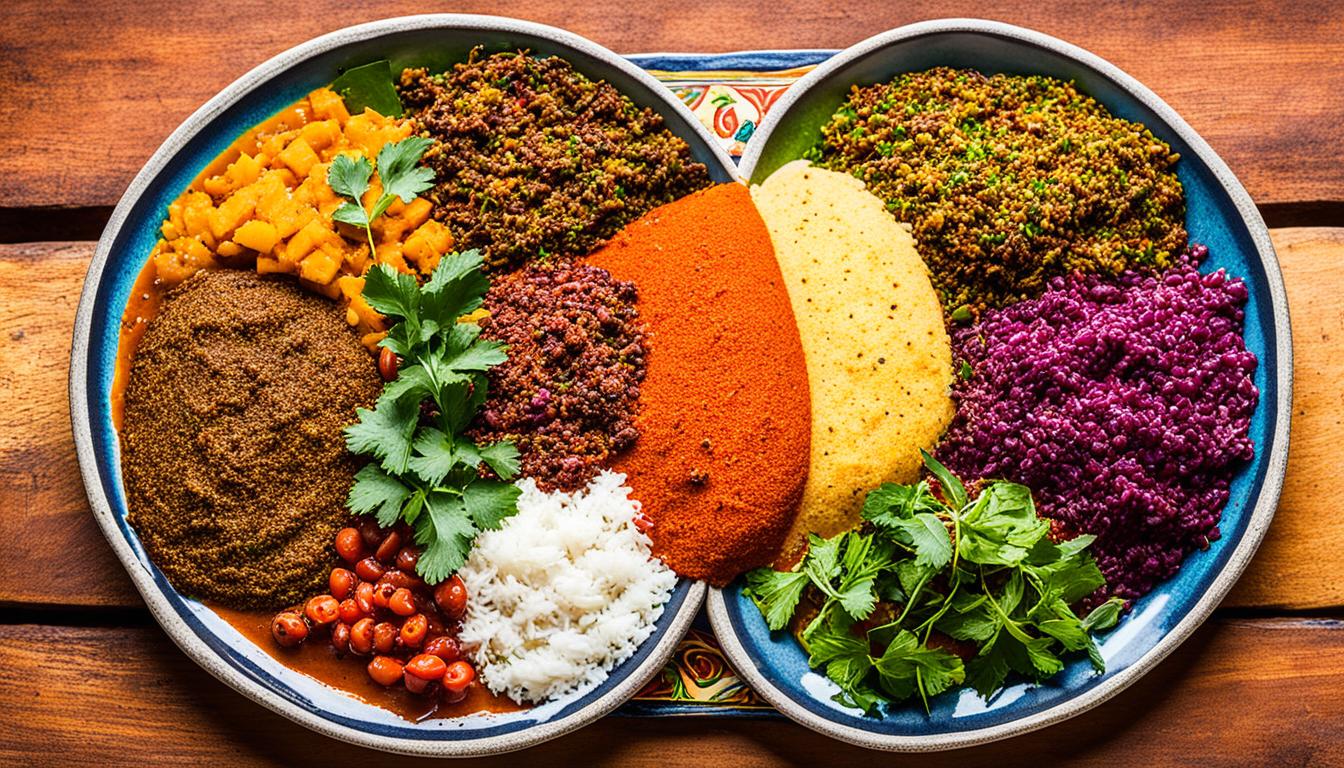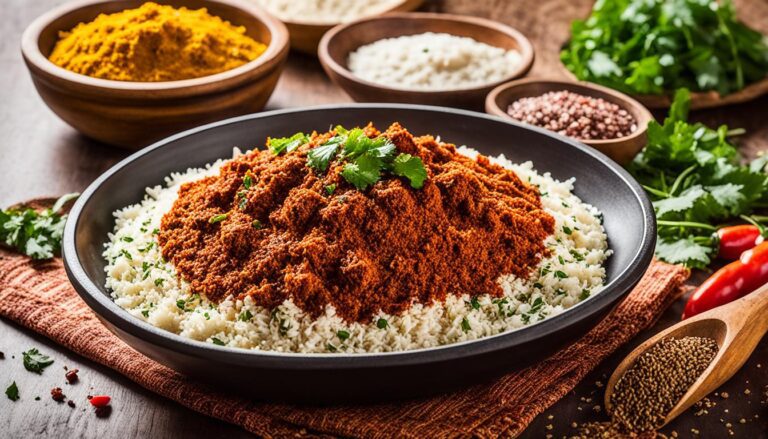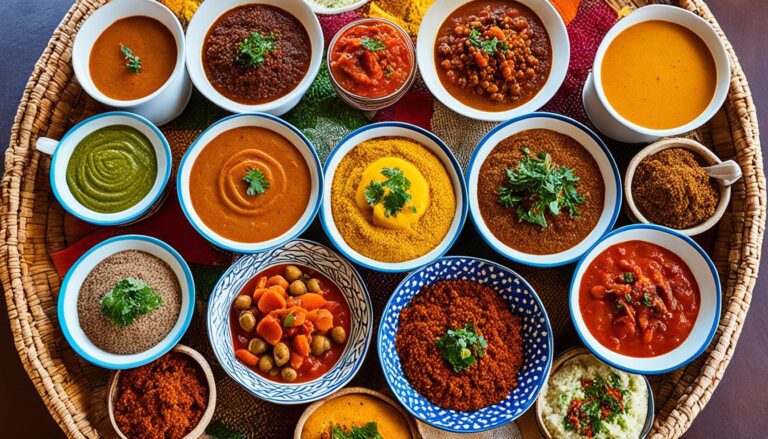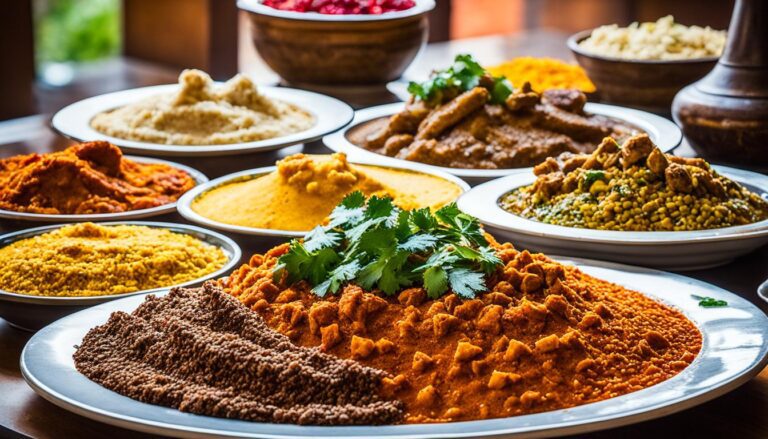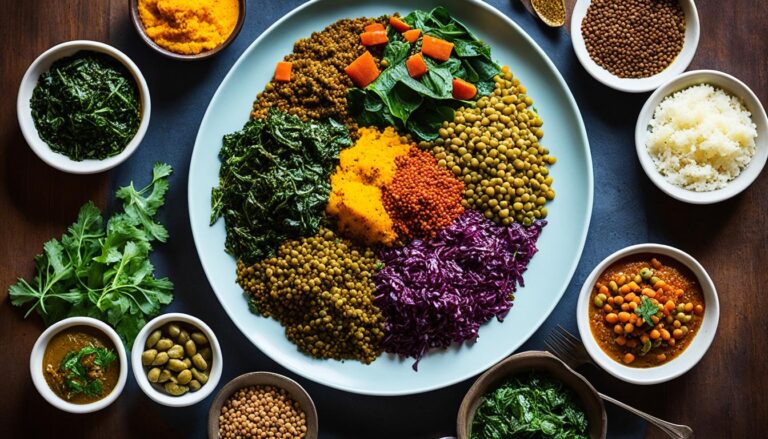Is Ethiopian Food Gluten Free?
Have you ever wondered if you can enjoy the delectable flavors of Ethiopian cuisine while following a gluten-free diet? Ethiopian food is known for its rich and aromatic dishes, but when it comes to gluten, there’s often a question mark. Can you savor the flavors of injera, doro wat, and kitfo without worrying about gluten? Let’s dive into the world of Ethiopian cuisine to find out!
Key Takeaways:
- Discover the flavors and characteristics of Ethiopian cuisine
- Explore the staple foods in Ethiopian meals, including the gluten-free grain teff
- Learn about a variety of gluten-free options available in Ethiopian food
- Understand the risks of cross-contamination when dining at Ethiopian restaurants
- Get valuable tips for enjoying gluten-free Ethiopian food while dining out
Understanding Ethiopian Cuisine
Before we dive into the gluten-free aspect of Ethiopian food, let’s take a moment to explore the unique characteristics and flavors that make Ethiopian cuisine so special.
Ethiopian cuisine is renowned for its vibrant and aromatic dishes, rich in spices and herbs. It is known for its diverse influences, blending flavors from African, Middle Eastern, and Indian cuisines. The result is a delightful fusion of bold and exotic tastes that tantalize the senses.
One of the distinct features of Ethiopian cuisine is the traditional way of eating, which typically involves sharing a communal platter. Diners gather around a large plate filled with various dishes, usually served on a layer of injera, a gluten-free flatbread.
Image:
Ethiopian cuisine offers a diverse array of dishes, with options to satisfy both meat lovers and vegetarians. Classic dishes like Doro Wat, a spicy chicken stew, and Kitfo, a seasoned minced beef dish, are just a taste of what Ethiopian cuisine has to offer.
Besides the delicious flavors, Ethiopian cuisine takes pride in its use of unique and nutritious ingredients. Teff, a tiny gluten-free grain, is the star of Ethiopian cooking and is used to make the famous injera. This spongy, sourdough-like bread is not only delicious but also acts as a utensil, used to scoop up various dishes.
A wide range of spices, such as berbere (a blend of chili powder, garlic, ginger, and more) and niter kibbeh (spiced clarified butter), adds depth and complexity to Ethiopian dishes. These flavors come together to create a culinary experience unlike any other.
Now that you have a better understanding of Ethiopian cuisine, let’s explore the gluten-free options available for those with dietary restrictions.
Staple Foods in Ethiopian Cuisine
When exploring Ethiopian cuisine, it is impossible to overlook the significance of injera, a traditional Ethiopian bread that plays a central role in their meals. Made from the gluten-free grain teff, injera is a versatile and delicious staple that forms the foundation of numerous dishes.
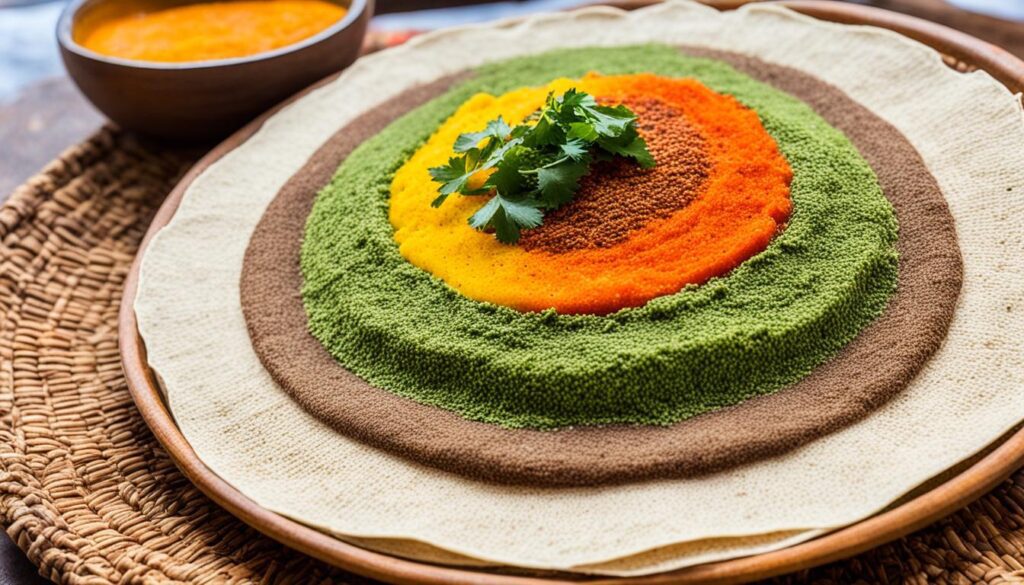
Injera has a distinct texture and flavor, with a spongy consistency and tangy taste. Its unique fermentation process gives it an appealing sourness, complementing the rich flavors of Ethiopian cuisine. This flatbread is typically used as both a serving platter and utensil, allowing diners to scoop up various stews, vegetables, and lentils with their hands.
Aside from injera, teff, the grain from which it is made, is also a key component in Ethiopian cooking. Teff is rich in nutrients and naturally gluten-free, making it an ideal choice for those with gluten sensitivities or dietary restrictions. It is not only used to create injera but also a variety of other dishes and baked goods.
With its nutty flavor and versatility, teff has gained popularity beyond Ethiopian cuisine as a nutritious alternative to gluten grains. Whether you’re enjoying a spongy injera topped with spicy stews or savoring teff-based porridge for breakfast, you’ll be delighted by the unique flavors and textures Ethiopia’s staple foods bring to the table.
Gluten-Free Options in Ethiopian Food
When it comes to gluten-free dining, Ethiopian cuisine offers a delightful array of dishes that cater to your dietary needs. From classic favorites to unique specialties, you’ll find plenty of options to explore while enjoying the rich flavors of Ethiopia.
Doro Wat: A Gluten-Free Delight
One of the most popular gluten-free dishes in Ethiopian cuisine is Doro Wat. This flavorful chicken stew is made with tender chicken pieces simmered in a spicy berbere sauce. Traditionally served with injera, a gluten-free flatbread made from fermented teff flour, Doro Wat is a must-try for gluten-free food lovers.
Kitfo: A Unique Gluten-Free Experience
For an adventurous palate, Kitfo is a gluten-free delicacy worth savoring. This dish consists of minced raw beef mixed with traditional Ethiopian spices and herbs. Served with injera or gluten-free bread, Kitfo offers a unique and tantalizing dining experience.
Ingredients Matter
The secret to creating gluten-free Ethiopian dishes lies in the careful selection of ingredients. Traditional spice blends, like berbere and mitmita, are typically free from gluten, adding robust flavors to various dishes. Additionally, teff flour, made from a gluten-free grain, is a staple ingredient used to make injera and other gluten-free bread options.
When dining at Ethiopian restaurants, it’s crucial to communicate your gluten-free dietary requirements to the staff. They are often knowledgeable about gluten-free options and can guide you towards safe choices.
With these gluten-free options and the commitment of Ethiopian chefs to meet dietary needs, you can enjoy a satisfying and diverse culinary experience without worrying about gluten!
Cross-Contamination Concerns
Eating out at Ethiopian restaurants can be an exciting culinary adventure for those following a gluten-free diet. However, it is important to be aware of the potential risks of cross-contamination, which can occur when gluten-free and gluten-containing foods come into contact with each other.
Cross-contamination can happen in various ways, such as through shared utensils, cooking surfaces, or even fryers. This can pose a challenge for individuals with gluten sensitivities or celiac disease, as even a small amount of gluten can trigger adverse reactions.
When dining at Ethiopian restaurants, it is crucial to communicate your dietary needs effectively to the staff. Use clear and direct language to convey that you require a gluten-free meal and emphasize the importance of preventing cross-contamination. You may want to ask about their understanding of gluten-free practices and inquire about specific measures they take to ensure a safe dining experience for those with gluten sensitivities.
Additionally, it can be helpful to request separate utensils, pans, and fryers specifically designated for gluten-free preparations. This can minimize the risk of cross-contamination and provide peace of mind when enjoying your meal.
While dining out, it is always recommended to exercise caution and trust your instincts. If you have concerns about the restaurant’s ability to accommodate your dietary needs or suspect cross-contamination, it may be best to explore other options or consult with the restaurant staff to find suitable alternatives.
By being proactive and diligent about cross-contamination concerns, you can enjoy the vibrant flavors of Ethiopian cuisine while staying true to your gluten-free lifestyle.

Dining Tips for Gluten-Free Eaters
When it comes to gluten-free dining, navigating menus and finding suitable options can sometimes be challenging. However, if you’re a fan of Ethiopian cuisine, you’re in luck! Ethiopian food offers a variety of gluten-free options that are both delicious and satisfying.
When dining out at Ethiopian restaurants, here are some valuable tips and advice to ensure a seamless gluten-free experience:
1. Communicate Your Dietary Needs
When you arrive at the restaurant, don’t hesitate to inform your server about your gluten-free requirements. Ethiopian restaurants are known for their hospitality and are generally accommodating to dietary needs. By communicating your needs upfront, the staff can guide you towards suitable gluten-free dishes and help you make informed choices.
2. Explore Traditional Ethiopian Dishes
While injera, the spongy Ethiopian bread made from teff, is a staple of the cuisine, it’s important to note that teff is naturally gluten-free. This means you can still enjoy the unique flavors of Ethiopian food without compromising your gluten-free lifestyle. Look for dishes that feature injera made from 100% teff or opt for gluten-free alternatives like rice or corn-based injera.
3. Avoid Cross-Contamination
While Ethiopian restaurants strive to provide gluten-free options, cross-contamination can still occur in the kitchen. To minimize the risk, consider requesting separate cooking utensils and equipment for your meal. Additionally, ask whether the restaurant has specific procedures in place to prevent cross-contamination and ensure your meal is prepared in a gluten-free environment.
4. Enjoy the Variety
One of the highlights of Ethiopian cuisine is the wide array of flavors and textures. From hearty stews to vibrant vegetable dishes, there is something to suit every palate. Don’t be afraid to explore the menu and try different dishes. And if you have any questions about specific ingredients or preparation methods, don’t hesitate to ask your server for guidance.
By following these dining tips, you can confidently enjoy gluten-free Ethiopian cuisine without compromising on taste or variety. So the next time you’re looking for a unique and flavorful dining experience, consider trying an Ethiopian restaurant. You’ll be pleasantly surprised by the gluten-free options available.
Conclusion
Gluten-free Ethiopian food offers a delightful and diverse culinary experience for those with dietary restrictions. Throughout this article, we have explored the characteristics, staple foods, and gluten-free options in Ethiopian cuisine. From the tangy injera made with gluten-free teff to flavorful dishes like Doro Wat and Kitfo, Ethiopian food provides plenty of delicious choices for gluten-free eaters.
However, it’s important to be aware of potential cross-contamination risks when dining out at Ethiopian restaurants. Communicating your dietary needs effectively and discussing any concerns with restaurant staff can help ensure a safe dining experience.
Whether you’re a gluten-free food lover or simply looking for new flavors to try, Ethiopian cuisine offers a range of gluten-free options that are both satisfying and culturally rich. So next time you’re craving a unique and flavorful meal, consider indulging in the gluten-free delights of Ethiopian food.

